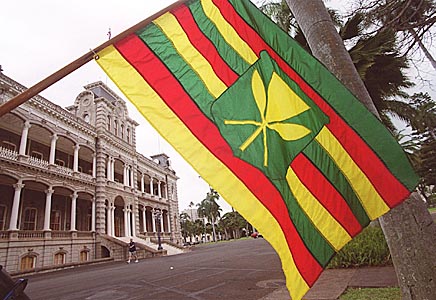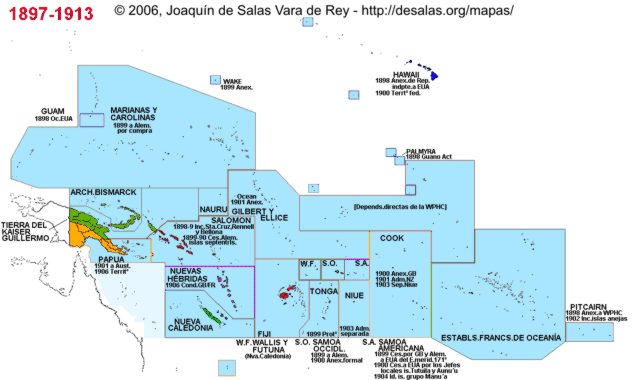Guns, guitars, and globalisation
As the 'Atenisi Institute gears up for 2013, this ad, which features me wearing a silly hat, has appeared in Tongan newspapers. When I donned that hat for the University of Auckland's PhD graduation ceremony a few years ago my mate Adrian Price said, in a suitably stern voice, "You do realise you'll have to wear that headgear permanently, from now on, as a condition of your degree, don't you? It makes it easier for society to keep an eye on you." Whenever Adrian encounters me now he looks at my bare head and frowns.
It is curious that 'Opeti Taliai, the new Dean of 'Atenisi, wears the flat hat given to Bachelor of Arts graduates in the advertisement. 'Opeti has a PhD from the Anthropology Department of Massey University, where he taught for a time, but perhaps nobody had a camera to hand when he picked up that degree.
'Opeti's PhD thesis, which is called 'The Legitimation of Economic and Political Power in Tonga: a critique of the Kau'halauta and Kauhalalalo moeities' and can be read on Massey's website, is an intricate and sometimes dizzying study of the symbolic dimensions of Tongan and Western Polynesian history. Examining antique legends and poems as well as a thousand years of events in Tonga, Samoa, and Fiji, 'Opeti shows that images and anecdotes which appear bizarre and nonsensical to palangi, and sometimes even to present-day Tongans, brim with an often sinister significance. At the core of 'Opeti's thesis is the conviction that the Tongan Empire which thrived in the late medieval period, and the modern Tonga state which was established in the shadow of that empire in the nineteenth century, were corruptions of a much more egalitarian society which existed across Western Polynesia in ancient times. 'Opeti's thesis is the foundation of a paper he will teaching this year at 'Atenisi called 'Tonga of Samoa'atoa in the Pacific'.
This is the outline of paper I'm organising which to take Pacific history into modern times. My paper will inevitably proceed very differently from 'Opeti's classes. Where he can delve effortlessly into the poems and traditions of his native land, and use them to elucidate the meaning of this or that event, I'm forced to proceed from one written source to another, and to retreat to abstract nouns like Imperialism or Globalisation for explanations of the patterns of the past.
Guns, guitars, and globalisation: a history of the modern Pacific
It is curious that 'Opeti Taliai, the new Dean of 'Atenisi, wears the flat hat given to Bachelor of Arts graduates in the advertisement. 'Opeti has a PhD from the Anthropology Department of Massey University, where he taught for a time, but perhaps nobody had a camera to hand when he picked up that degree.
'Opeti's PhD thesis, which is called 'The Legitimation of Economic and Political Power in Tonga: a critique of the Kau'halauta and Kauhalalalo moeities' and can be read on Massey's website, is an intricate and sometimes dizzying study of the symbolic dimensions of Tongan and Western Polynesian history. Examining antique legends and poems as well as a thousand years of events in Tonga, Samoa, and Fiji, 'Opeti shows that images and anecdotes which appear bizarre and nonsensical to palangi, and sometimes even to present-day Tongans, brim with an often sinister significance. At the core of 'Opeti's thesis is the conviction that the Tongan Empire which thrived in the late medieval period, and the modern Tonga state which was established in the shadow of that empire in the nineteenth century, were corruptions of a much more egalitarian society which existed across Western Polynesia in ancient times. 'Opeti's thesis is the foundation of a paper he will teaching this year at 'Atenisi called 'Tonga of Samoa'atoa in the Pacific'.
This is the outline of paper I'm organising which to take Pacific history into modern times. My paper will inevitably proceed very differently from 'Opeti's classes. Where he can delve effortlessly into the poems and traditions of his native land, and use them to elucidate the meaning of this or that event, I'm forced to proceed from one written source to another, and to retreat to abstract nouns like Imperialism or Globalisation for explanations of the patterns of the past.
Guns, guitars, and globalisation: a history of the modern Pacific
This paper considers the history of the Pacific since the visits of Cook to the region.
In the late eighteenth and early nineteenth centuries, Cook and later European mariners, traders, and missionaries brought the technologies, forms of organisation, and economic arrangements we consider modern to the Pacific.
The peoples of the Pacific quickly took up modern innovations and adapted them to their own needs. Traditional wooden tools and weapons were complemented or replaced by iron ploughs and muskets; new instruments like the guitar were seized on by many Pacific musicians; the Bible was interpreted in the light of local experience.
As the nineteenth century went on, the contradictions increased between the Europeans, with their northern hemisphere conception of what a modern society should look like, and the hybrid 'counter-modernities' that Pacific Islanders were creating, as they fused old ways of life with the innovations the outsiders had brought.
In the second half of the nineteenth century colonial powers like Britain, France, Germany, and the United States came into political, economic, and sometimes military conflict with emerging Pacific states like the Waikato Kingdom, the unified Tonga of Tupou I, the Fijian realm of King Cakobau, and the powerful Kingdom of Hawaii. Every Pacific nation except Tupou's Tonga was eventually defeated and colonised.
As we consider the years when the Pacific succumbed to its colonisers, we will look at events like the British invasion of the Waikato Kingdom, the terrorising of Fiji by a branch of the Ku Klux Klan established by Confederate American settlers, and the division of Samoa between the United States and Germany after a series of wars.
Because of his unique achievement in preserving his country's independence, we will examine in detail Tupou I's long career as a warrior, man of God, politician, and diplomat, and look at how he has shaped modern Tonga.
In the twentieth century the conflict between northern hemisphere and local visions of modernity did not end: in places like Samoa, Aotearoa, and Fiji resistance to colonial rule was widespread. As we look at the details of some of these struggles, we will see colonial police gunning down Samoans on the streets of Apia, Maori being imprisoned in their hundreds for refusing to serve in New Zealand's army, and indigenous Hawaiians demanding first statehood and then independence from America.
We will also look at some of the new peoples who came to the Pacific during the era of colonisation. The Pakeha of New Zealand, Caldoche of New Caledonia, and German Samoans were settler peoples, who took a dominant role in their new homelands; the Indians of Fiji and the Chinese of Samoa, by contrast, were brought to the Pacific as indentured labourers, and typically faced discrimination from colonial authorities. Both the settler peoples and the descendants of indentured labourers have been divided internally by class and by religion.
We will examine the diverse ways in which the new peoples of the Pacific have related to the region's indigenous inhabitants. In Samoa, some of the great opponents of colonial rule were the offspring of settlers; other members of the settler community, though, opposed decolonisation, and formed a Samoan Nazi Party which appealed to Hitler to reconquer Germany's old colony. In New Zealand, Pakeha fought for as well as against nationalist Maori during conflicts like the Waikato War.
Over the past fifty years many of the Pacific's colonised peoples have won their independence, and former anti-colonial activists have become the leaders of new states. But the era of political decolonisation has coincided with a time of economic globalisation, and the new nations of the Pacific have come under pressure to open their doors to imports, investment, and business practices from the First World. In the later parts of this paper we will examine some of the changes globalisation has brought to the Pacific, like increased pollution, sharper class divisions, easier international travel, cheap consumer goods, rises in crime, and mass tourism. We will ask whether the old contradiction between Pacific and northern hemisphere visions of the future still exists in the twenty-first century.
The history and present of the Pacific are full of controversies, and this paper will make no attempt to deny them. Students will be introduced to the arguments which scholars have had with one another about subjects like colonialism and globalisation, and encouraged to develop their own opinions.
Throughout the paper, we will use excerpts from movies and from television and radio programmes to help highlight issues and provoke discussion. We will also make field trips to sites around Nuku'alofa - Tupou I's old stronghold of Mount Zion, for instance - which are important to the history or present of the Pacific.
The paper will be internally assessed.





2 Comments:
One for the radical travel files
http://nz.totaltravel.yahoo.com/news-opinions/news/a/-/15850672/belgian-woman-drives-3000km-across-europe-by-mistake/
peopaganda.
Post a Comment
<< Home